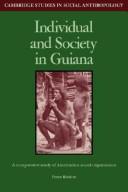| Listing 1 - 5 of 5 |
Sort by
|
Book
ISBN: 0571092721 9780571092727 Year: 1970 Publisher: London : Faber & Faber,
Abstract | Keywords | Export | Availability | Bookmark
 Loading...
Loading...Choose an application
- Reference Manager
- EndNote
- RefWorks (Direct export to RefWorks)
Carib Indians --- Fiction --- -Fiction --- Caribbean Area --- -Calinya Indians --- Caraib Indians --- Caribe Indians --- Caribice Indians --- Caribisi Indians --- Cariña Indians --- Charibbs --- Galibi Indians --- Kalinya Indians --- Kariña Indians --- Karinya Indians --- Cariban Indians --- Indians of South America --- -Caribbean Free Trade Association countries --- Caribbean Region --- Caribbean Sea Region --- West Indies Region --- Calinya Indians --- Fiction. --- Carib Indians - - Fiction --- Caribbean Area - - Fiction --- -Caribbean Area --- -Carib Indians
Book
ISBN: 0571094635 9780571094639 Year: 1971 Publisher: London : Faber & Faber,
Abstract | Keywords | Export | Availability | Bookmark
 Loading...
Loading...Choose an application
- Reference Manager
- EndNote
- RefWorks (Direct export to RefWorks)
Caribbean Area --- -Fiction --- -Caribbean Free Trade Association countries --- Caribbean Region --- Caribbean Sea Region --- West Indies Region --- Fiction --- Carib Indians --- Calinya Indians --- Caraib Indians --- Caribe Indians --- Caribice Indians --- Caribisi Indians --- Cariña Indians --- Charibbs --- Galibi Indians --- Kalinya Indians --- Kariña Indians --- Karinya Indians --- Cariban Indians --- Indians of South America --- Caribbean Free Trade Association countries --- Social life and customs --- Fiction. --- Caribbean Area - - Fiction --- -Carib Indians
Book
ISBN: 9788416923786 8416923787 Year: 2018 Publisher: Madrid: Antígona,
Abstract | Keywords | Export | Availability | Bookmark
 Loading...
Loading...Choose an application
- Reference Manager
- EndNote
- RefWorks (Direct export to RefWorks)
Uruguayan drama --- Blanco, Sergio. - Ira de Narciso --- Calderón, Gabriel, - 1982- - Mi muñequita. --- Morena, Marianella. - Don Juan, el lugar del beso --- Percovich, Mariana. - Chaika --- Sanguinetti, Santiago, - 1985- - Teoría del eterno retorno aplicada a la revolución en el Caribe --- Suárez, Roberto, - 1970- - Bienvenido a casa
Book
ISBN: 9789042038851 9042038853 940121168X 9789401211680 Year: 2014 Volume: 77 Publisher: Amsterdam Editions Rodopi
Abstract | Keywords | Export | Availability | Bookmark
 Loading...
Loading...Choose an application
- Reference Manager
- EndNote
- RefWorks (Direct export to RefWorks)
From wide-ranging overviews of the entire region to close readings of specific works, this volume opens a fascinating window on the literatures and cultures of the Caribbean, covering texts in the multiplicity of languages used in the wider Caribbean: Spanish, English, French, Dutch, Portuguese, and the region’s many creoles. Authors and works discussed range from luminaries such as Derek Walcott to hitherto practically unknown works in Antillean creole languages. Underlying is the idea to foster the study of the Caribbean literary, artistic and visual text through a comparative lens, a firm proposal to think beyond the persisting linguistic barriers and scholarly divides in the field. As such, Caribbeing: Comparing Caribbean Literatures and Cultures brings a new approach to the Caribbean embracing the region’s linguistic multiplicity and complexity without eschewing the many theoretical challenges and obstacles such a scholarly endeavor entails. Because of its ample scope this book will appeal to scholars and students working on the Caribbean and Latin America, but also to those interested in the broader fields of postcolonial and cultural studies.
Caribbean literature --- Cross-cultural studies --- History and criticism --- Caribbean Area --- Civilization --- Social life and customs --- Littérature caribéenne --- Littérature caribéenne. --- Comparison of cultures --- Inter-cultural studies --- Intercultural studies --- Trans-cultural studies --- Transcultural studies --- Culture --- Ethnology --- Social sciences --- History and criticism. --- Methodology --- Caribbean Free Trade Association countries --- Caribbean Region --- Caribbean Sea Region --- West Indies Region --- Caribbean literature - History and criticism --- Cross-cultural studies - Caribbean Area --- Caribbean Area - Civilization --- Caribbean Area - Social life and customs --- Littérature caribéenne.

ISBN: 0521264537 0521269970 0511558112 9780521264532 9780521269971 9780511558115 Year: 1984 Volume: 51 Publisher: Cambridge Cambridge University Press
Abstract | Keywords | Export | Availability | Bookmark
 Loading...
Loading...Choose an application
- Reference Manager
- EndNote
- RefWorks (Direct export to RefWorks)
The Amerindian peoples of Guiana, the geographical region of north-east South America, have long been recognized as forming a distinct variety of the tropical forest culture. In this book, Peter Rivière employs a comparative perspective to reveal that Guianan societies, generally characterized as socially fluid and amorphous, are in fact much more highly structured than they first appear, and he identifies certain common patterns of social organization that result from sets of individual choices and relationships. By contrasting the characteristics of Guianan society with those from elsewhere in Lowland South America, he constructs a spectrum of complexity of Amerindian social structure, and argues that the Guianan variant represents the logically simplest form of organization in the area.
Indians of South America --- Carib Indians --- Social structure --- Indiens d'Amérique --- Caraïbes (Indiens) --- Structure sociale --- Social conditions --- Conditions sociales --- Social conditions. --- Indiens d'Amérique --- Caraïbes (Indiens) --- Social Sciences --- Anthropology --- Organization, Social --- Social organization --- Sociology --- Social institutions --- American aborigines --- American Indians --- Indigenous peoples --- Calinya Indians --- Caraib Indians --- Caribe Indians --- Caribice Indians --- Caribisi Indians --- Cariña Indians --- Charibbs --- Galibi Indians --- Kalinya Indians --- Kariña Indians --- Karinya Indians --- Cariban Indians --- Ethnology --- Indians of South America - Guiana - Social conditions. --- Carib Indians - Social conditions. --- Social structure - Guiana.
| Listing 1 - 5 of 5 |
Sort by
|

 Search
Search Feedback
Feedback About UniCat
About UniCat  Help
Help News
News